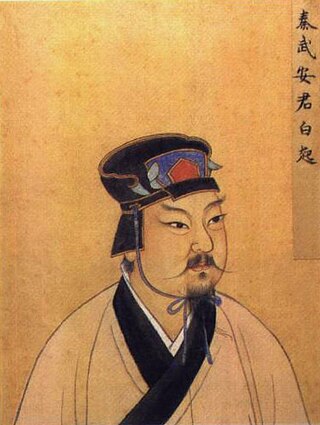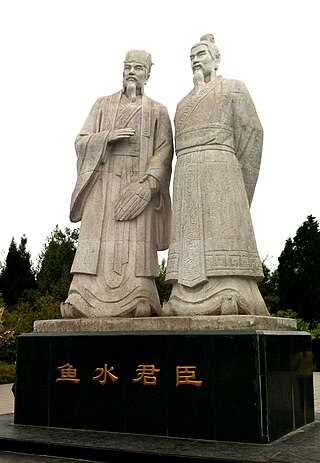Related Research Articles

The Warring States period in Chinese history comprises the final centuries of the Zhou dynasty, which were characterized by warfare, bureaucratic and military reform, and political consolidation. It followed the Spring and Autumn period and concluded with the wars of conquest that saw the state of Qin annex each of the other contender states by 221 BC and found the Qin dynasty, the first imperial dynastic state in East Asian history.

Wei was one of the seven major states during the Warring States period of ancient China. It was created from the three-way Partition of Jin, together with Han and Zhao. Its territory lay between the states of Qin and Qi and included parts of modern-day Henan, Hebei, Shanxi, and Shandong. After its capital was moved from Anyi to Daliang during the reign of King Hui, Wei was also called Liang.

Bai Qi, also known as Gongsun Qi (公孫起), was a Chinese military general of the Qin state during the Warring States period. Born in Mei, Bai Qi served as the commander of the Qin army for more than 30 years, being responsible for the deaths of over one million, earning him the nickname Ren Tu. According to the Shiji, he seized more than 73 cities from the other six hostile states, and to date no record has been found to show that he suffered a single defeat throughout his military career. He was instrumental in the rise of Qin as a military hegemon and the weakening of its rival states, thus enabling Qin's eventual conquest of them. He is regarded by Chinese folklore as one of the four Greatest Generals of the Late Warring States period, along with Li Mu, Wang Jian, and Lian Po; he is also remembered as the most fearsome amongst the four.

The Seven Warring States or Seven Kingdoms were the seven leading hegemonic states during the Warring States period of Ancient China:

The grand chancellor, also translated as counselor-in-chief, chancellor, chief councillor, chief minister, imperial chancellor, lieutenant chancellor and prime minister, was the highest-ranking executive official in the imperial Chinese government. The term was known by many different names throughout Chinese history, and the exact extent of the powers associated with the position fluctuated greatly, even during a particular dynasty.

King Zhaoxiang of Qin, also abbreviated as King Zhao of Qin (秦昭王), born Ying Ji (嬴稷), was the king of the Qin state from 306 BC to 251 BC. He was the son of King Huiwen and younger brother of King Wu.
The Jixia Academy or Academy of the Gate of Chi was a scholarly academy during the Warring States period. It was located in Linzi, the capital of Qi. The academy took its name from its position outside the city's western gate, named for the harvest god Ji or Hou ji

Wei, commonly spelled Wey to distinguish from the contemporary larger Wei (魏) state, was an ancient Chinese state that was founded in the early Western Zhou dynasty and rose to prominence during the Spring and Autumn period. Its rulers were of the surname Ji (姬), the same as that of the rulers of Zhou. It was located in modern northeastern Henan Province, east of Jin, and west of Cao.

Lord Mengchang, born Tian Wen, was an aristocrat and statesman of the Qi Kingdom of ancient China, one of the famed Four Lords of the Warring States period. He was a son of Tian Ying and grandson of King Wei of Qi. He succeeded to his father's fief in Xue. Lord Mengchang is well known for the size of his entourage. According to the Records of the Grand Historian, he had up to three thousand people in his retinue. Lord Mengchang would eventually become the Chancellor of Qi and of Wei.
Meng Yi was a Chinese military general and politician. As an official of the Qin dynasty, he served in the court of Qin Shi Huang. He was a younger brother of the general Meng Tian. After Qin Shi Huang's death, Meng Yi and his brother were executed by Qin Er Shi on the urging of Zhao Gao.
King Wei of Qi, whose personal name was Tian Yinqi (田因齊), was the king of the northern Chinese state of Qi during the Warring States period, when Qi was one of the most powerful states in China. He reigned from 356 to 320 BC. or according to another source from 378 to 343 BC. He was the first ruler of Qi to style himself "king".

King You of Chu was from 237 to 228 BC the king of the state of Chu during the late Warring States period of ancient China. He was born Xiong Han and King You was his posthumous title.

The post of prime minister, translated as prime minister or chancellor, was an official government position established in the Chu state during the Spring and Autumn period of Chinese history.
Lord Xinling, born Wei Wuji (魏無忌), was a prominent aristocrat, statesman and general of the Warring States period and one of the Four Lords of the Warring States. The son of King Zhao of Wei, and the half-brother of King Anxi of Wei, he served the State of Wei as Senior General.

Changping of the War, also known as The Battle of Changping, is a Chinese television series based on the events surrounding the Battle of Changping, fought between the states of Qin and Zhao during the Warring States period. The series was produced in 2004 but has yet to be aired on television stations in China.

Lord Chunshen, born Huang Xie ,was a Chinese military general and politician. He served as the Prime Minister of the Kingdom of Chu during the late Warring States period of ancient China. He was one of the Four Lords of the Warring States.
Lord Pingyuan, born Zhao Sheng, was a prominent nobleman and chancellor of the State of Zhao during the Warring States period of ancient China, and one of the Four Lords of the Warring States. He was a son of King Wuling of Zhao, and served as chancellor in the courts of his brother King Huiwen and his nephew King Xiaocheng.
King Anxi of Wei, personal name Wei Yu, was King of Wei from 276 BC to 243 BC. He was the son of King Zhao of Wei and the older brother of Lord Xinling. In 275 BC, after a Han general fled to the Wei capital Daliang, King Anxi began a war against Qin in an alliance with Qi. Qin forces under chancellor Wei Ran and general Bai Qi captured 4 cities, besieged Daliang and killed 40,000 people. In 273 BC, with the assistance of Lord Mengchang of Qi, he began another war in an alliance with Zhao. The war ended with the deaths of 130,000 people. In 257 BC, he assisted Zhao when its capital Handan was besieged by Qin forces, at the request of Lord Pingyuan of Zhao, who was married to Xinling's older sister.

The Battle of Handan began in 259 BC and concluded in 257 BC, during which the garrison of Handan, the capital city of Zhao, joined by the allied force of Wei and Chu, defeated the invading army of Qin. It was one of the most remarkable failures of the Qin army after the Reform of Shang Yang.

The Qin Empire III is a 2017 Chinese television series based on Sun Haohui's novel of the same Chinese title, which romanticizes the events in China during the Warring States period primarily from the perspective of the Qin state under King Zhaoxiang. It was first aired on CCTV-1 in mainland China in 2017. It was preceded by The Qin Empire (2009) and The Qin Empire II: Alliance (2012) and followed by The Qin Empire IV (2019), which were also based on Sun Haohui's novels.
References
Notes
- ↑ Gōngzǐ (公子) literally means "the lord's son", "the young lord" or "the lordling", indicating the name bearer being a son of a ruler of a client state.
- ↑ Period of the Warring States
- ↑ Biographies of Lord Pingyuan and Yu Qing 是時齊有孟嘗,魏有信陵,楚有春申,故爭相傾以待士。
- ↑ Biography of Lord Chunshen 春申君既相楚,是時齊有孟嘗君,趙有平原君,魏有信陵君,方爭下士,招致賓客,以相傾奪,輔國持權。
Works cited
- Lewis, Mark Edward (1999), "Warring States Political History", in Michael Loewe; Edward L. Shaughnessy (eds.), The Cambridge History of Ancient China: From the Origins of Civilization to 222 B.C., Cambridge: Cambridge University Press, pp. 587–650, ISBN 0-521-47030-7.